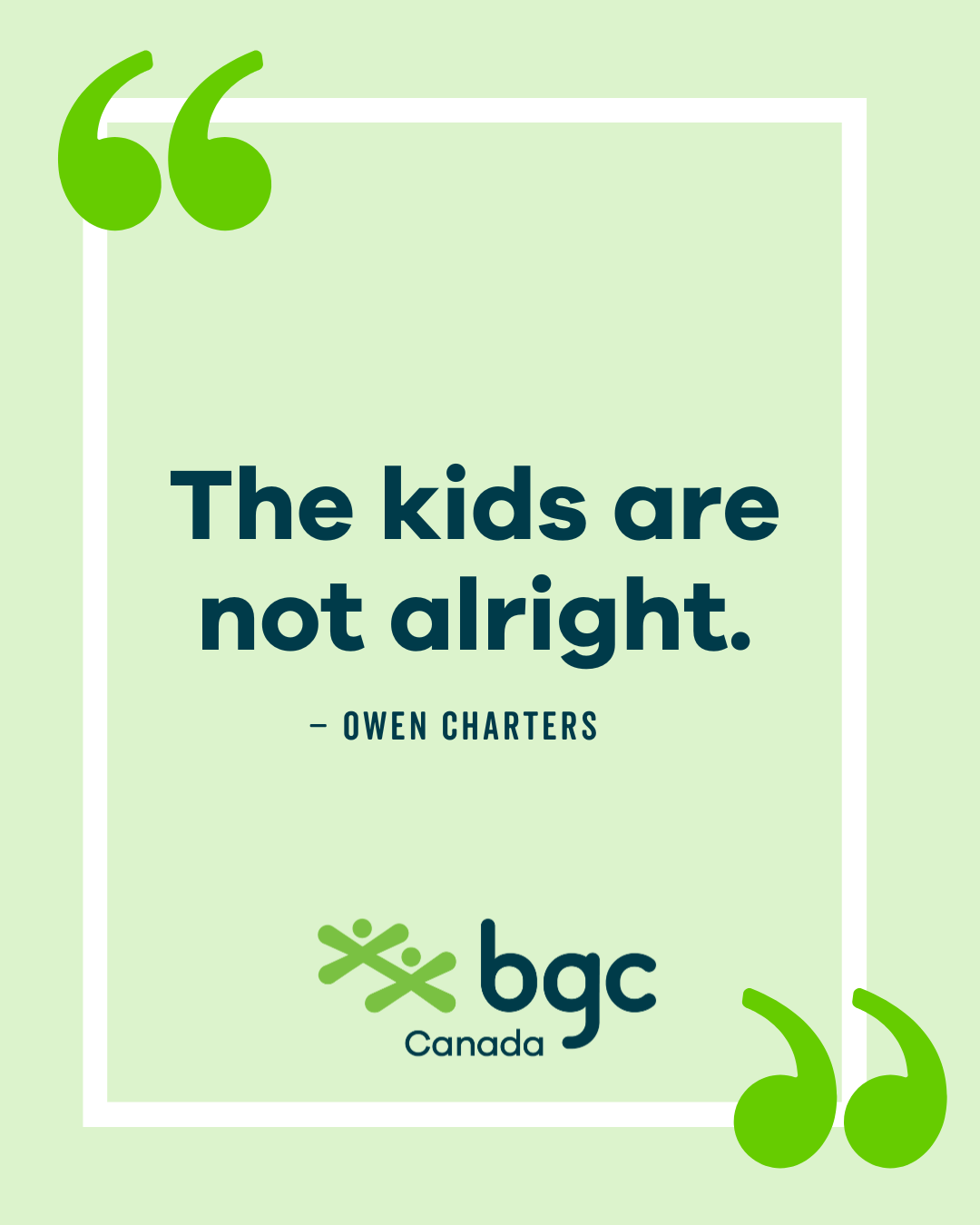By Owen Charters, President & CEO, BGC Canada
May 10, 2024
Yesterday, I attended the First Annual Mental Health Summit in Ottawa, where I presented on a youth mental health panel. Unfortunately, the message was that the kids are not alright.
On one hand, kids are better at identifying and managing mental health issues than ever before – they know about and talk about issues like anxiety and depression, self-harm and suicide ideation without the same hesitation and stigma that older generations have. They routinely self-identify when they are feeling symptoms of poor mental health. This is good – knowing the problem helps with fixing the problem.

But the problem persists. It was prevalent before the pandemic, and it is worse today. Kids are vulnerable and are easily influenced. They are struggling with the intrusion of social media in their lives (and the abuse, bullying and isolation it permits), the polarization of the political realm, the influence and availability of opioids and other substances. Food insecurity, labour insecurity, and housing insecurity also all contribute. They struggle with the social skills they need to operate effectively in society – and two years of being rigidly anti-social during a pandemic (that hit them in their formative socialization years) – is a real one.
BGC Clubs are witness to this problem and are trying to provide help. And it manifests in staff mental health challenges as well – dealing with the stress of other stressed-out youth takes a toll, but also the same societal problems are affecting the staff as they try to be professional mentors too.
There is no easy solution.
However, the conversation on my panel led to the things we can do. And the answer in some cases – in many cases – is Clubs. The answer is not that Clubs have to provide more formal mental health supports. It’s not even that we need to run more of our BounceBack League or Flex Your Head programs (although that would be great!) – for those of you that don’t know these programs, they are explicitly designed around mental health discussions and engagement.
Clubs just need to be Clubs. Social health equals mental health. Engaging with other humans in a non-hierarchical setting, without the pressures of school and without the stress of family dynamics, is incredibly effective at building healthy, resilient, social engagement and stronger mental health. For adults, this might be called the coffee shop or the pub, or even your local sports league or running group. For kids, it’s places like BGC Clubs.
I don’t mean to be flippant. Social engagement does not resolve inclinations for self-harm, or suicidal thoughts. It does not cure clinical depression and anxiety. Those require support from trained professionals. And Clubs can and do access these services or provide referrals.
But we have a prevalence of mental health concerns today. In fact the New York Times reported on the fact that a recent study showed that the more mental health was discussed with youth, those same youth then reported that their mental health was worse. This is called ‘prevalence inflation’ – the more you discuss something, the more people feel they may identify with the problem personally. It’s a bit like Googling the symptoms of your sore throat – twelve clicks later, and you start to believe you only have weeks to live.
To combat this, the more we discuss mental health and normalize our approach to it, the more we also need to increase normalizing social situations where children and teens can just be themselves and hang out. If we see everything through the lens of mental health, we exacerbate the problem. But if we integrate it in our work and allow it to fade to the background and let a supportive, social, and engaging experience take the lead, we will see better outcomes. Getting support for your homework, playing basketball, learning to cook a new dish – all of these are forms of mental health supports that don’t fit a formal, clinical support model. At the core, this is what Clubs are, and what Clubs do.
Sadly, we still must deal with the rise of serious mental health challenges. I have had more parents come to me – not necessarily of Club kids – who are seeking help for their children, and I hear dire and difficult stories of self-harm, violence, and acting out, and desperate parents who don’t know how to get the help they need. I am shocked at how often this is mentioned to me in social settings, over a drink, at a meal – more families need help. I am glad that they are talking about it, and seeking the help they need. We continue to work to reduce the stigma that comes from talking about mental health.
And in the most difficult situations, we must remember how Clubs rally to provide the essential, front-line support that’s needed. When I met with some Toronto Clubs earlier this week, I heard devastating stories of the effects of gun violence on Club kids – and how traumatized families don’t get the supports they need in the immediate hours after a shooting or fatality – police services, city services are focused on their work, and that doesn’t mean 24-hour support for a grieving family. When no one is there for the family, the Club is, providing immediate needs, wrapping their arms around the grief and trauma – staying with them with food and comfort for as long as necessary. In fact, the City calls on some of our Toronto Clubs to provide support when they know they can’t. Other social services have working hours only – Clubs fill these gaps and work 24/7 for whatever is needed. I cannot imagine greater distress than losing a child to gun violence and I am disturbed to hear that social services don’t provide what is needed at those times. This is a condemnation of our broken systems – the mental health system doesn’t provide what is needed. But once again, Clubs do.
The CEO of the Canadian Mental Health Association, Margaret Eaton, described our mental health system as a quilt, a frayed patchwork of bits and pieces put together in odd ways to try to cover the needs of Canadians. Clubs are an essential part of that quilt, and we are asking for investment in our work, and recognition of the essential services that Clubs provide to children, youth, and families.
Help BGC Canada support youth mental health.

